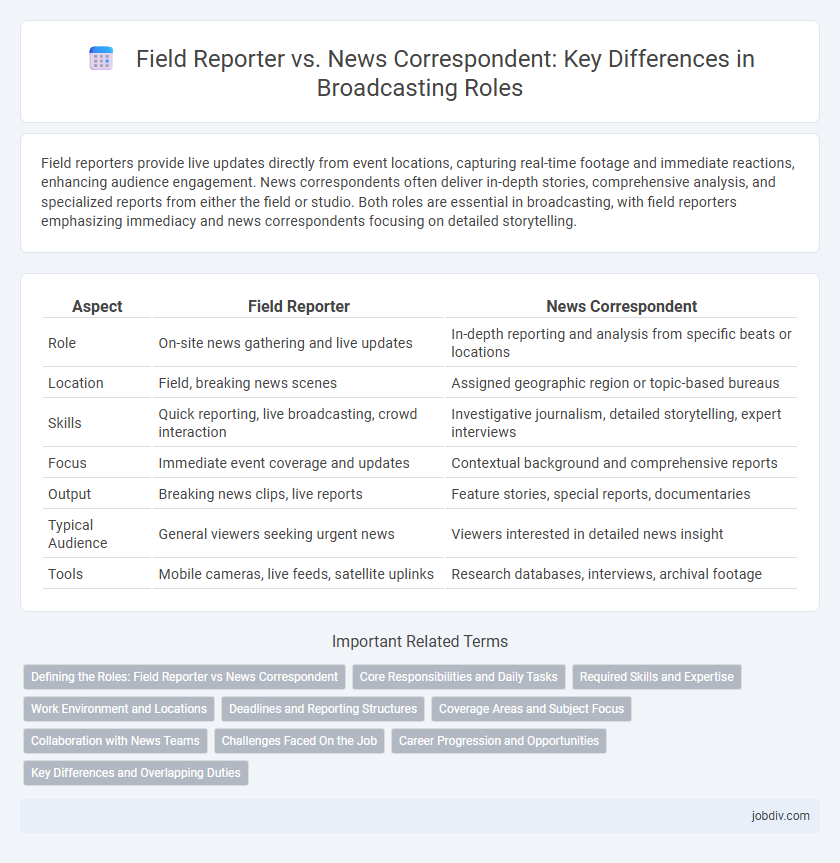Field reporters provide live updates directly from event locations, capturing real-time footage and immediate reactions, enhancing audience engagement. News correspondents often deliver in-depth stories, comprehensive analysis, and specialized reports from either the field or studio. Both roles are essential in broadcasting, with field reporters emphasizing immediacy and news correspondents focusing on detailed storytelling.
Table of Comparison
| Aspect | Field Reporter | News Correspondent |
|---|---|---|
| Role | On-site news gathering and live updates | In-depth reporting and analysis from specific beats or locations |
| Location | Field, breaking news scenes | Assigned geographic region or topic-based bureaus |
| Skills | Quick reporting, live broadcasting, crowd interaction | Investigative journalism, detailed storytelling, expert interviews |
| Focus | Immediate event coverage and updates | Contextual background and comprehensive reports |
| Output | Breaking news clips, live reports | Feature stories, special reports, documentaries |
| Typical Audience | General viewers seeking urgent news | Viewers interested in detailed news insight |
| Tools | Mobile cameras, live feeds, satellite uplinks | Research databases, interviews, archival footage |
Defining the Roles: Field Reporter vs News Correspondent
Field reporters are journalists who cover live events directly from the scene, providing real-time, on-the-ground updates that capture the immediacy of breaking news. News correspondents often specialize in particular areas or regions, offering in-depth analysis and comprehensive reporting that contextualizes events within broader narratives. Both roles are essential in broadcasting, with field reporters delivering dynamic coverage and correspondents enhancing stories through expertise and detailed investigation.
Core Responsibilities and Daily Tasks
Field reporters primarily gather live information from event locations, conducting interviews and capturing real-time footage to provide immediate news updates. News correspondents analyze, verify, and deliver in-depth reports, often specializing in specific beats or regions to offer comprehensive coverage. Both roles require strong communication skills, but correspondents typically engage in more investigative work and editorial input compared to the primarily on-the-ground reporting of field reporters.
Required Skills and Expertise
Field reporters must excel in on-the-spot reporting, quick information gathering, and live broadcasting under unpredictable conditions. News correspondents require deep subject matter expertise, strong research skills, and the ability to provide detailed, contextual analysis often from remote or international locations. Both roles demand excellent communication, adaptability, and a keen understanding of journalistic ethics.
Work Environment and Locations
Field reporters operate primarily on location, covering live events such as breaking news, natural disasters, and public gatherings, often working in unpredictable and dynamic environments. News correspondents, on the other hand, frequently work from designated bureaus or studios, providing in-depth analysis and structured reporting, though they may also travel internationally for specialized stories. Both roles require adaptability but differ in the immediacy and nature of the work environment, with field reporters immersed in real-time events and correspondents handling broader coverage from more stable settings.
Deadlines and Reporting Structures
Field reporters operate on tight deadlines, often delivering live updates directly from the scene, requiring rapid information gathering and real-time broadcasting skills. News correspondents typically have structured reporting schedules and work within established editorial frameworks, providing in-depth analysis after verifying facts. While field reporters prioritize immediate coverage, news correspondents focus on comprehensive storytelling aligned with newsroom priorities.
Coverage Areas and Subject Focus
Field reporters primarily cover breaking news and live events within a specific geographic area, providing on-the-ground updates and immediate eyewitness accounts. News correspondents often specialize in broader subject areas such as politics, economics, or international affairs, delivering in-depth analysis and reports that may span multiple regions or countries. The distinct focus allows field reporters to capture real-time developments while correspondents provide contextual background and expert perspectives across wider coverage areas.
Collaboration with News Teams
Field reporters often collaborate closely with local news teams to provide immediate, on-the-ground coverage, ensuring timely and relevant updates for viewers. News correspondents typically work with national or international news bureaus, coordinating with editors and producers to deliver in-depth analysis and comprehensive reports. Both roles require seamless communication and coordination to maintain newsroom coherence and deliver accurate, engaging news stories.
Challenges Faced On the Job
Field reporters confront unpredictable environments, often working under tight deadlines while capturing live events amidst noise and crowd interference. News correspondents face challenges such as coordinating with multiple news bureaus, conducting in-depth investigations remotely, and managing complex technical setups for seamless broadcasts. Both roles demand adaptability, quick decision-making, and resilience to handle pressure and ensure accurate, timely news delivery.
Career Progression and Opportunities
Field reporters often start their careers covering local events and breaking news, gaining hands-on experience in fast-paced environments. News correspondents typically advance to international or specialized beats, leveraging their expertise and reputation to report on major global issues. Career progression for correspondents usually includes opportunities for anchor roles, investigative journalism, or editorial positions, reflecting increased responsibility and influence in broadcasting.
Key Differences and Overlapping Duties
Field reporters primarily gather real-time information and live footage from event locations, focusing on breaking news and on-the-ground updates, while news correspondents often provide in-depth analysis and cover broader, ongoing stories from specific beats or regions. Both roles require interviewing witnesses, verifying facts, and delivering accurate reports, yet correspondents typically have more editorial responsibility and longer-term story development. The overlap lies in their shared goal of delivering timely, factual content, though their scope and narrative depth differ significantly in broadcasting.
Field Reporter vs News Correspondent Infographic

 jobdiv.com
jobdiv.com